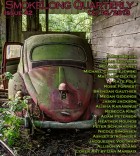What struck me at first about this piece was the language, how it leads the reader in one direction: cows sitting down in field—”They have the sweetest faces, not like cows at all, more like rabbits or golden retrievers, something that could curl up behind my knees”—and then seamlessly becomes something else—”I left my key taped to the shower drain, and, hell, my jaw aches, feels like purple fingers clawing down my throat.” Please talk about how you use words to develop story. Which comes first, language or meaning?
I kinda love that this is your first question because it’s something I think about often. There’s no question that language drives most of my writing, but there’s always a fear that meaning will be sacrificed. I come from a theatre background, and I wonder if the notion of “words spoken out loud” is somehow instilled in me. I tend to write first-person stories, and finding that person’s voice—the rhythm—is essential. Because of this, I write out loud. I speak the phrases as I write them, often revving certain sounds of a word combination. I know one thing: this practice makes it awkward to work in coffee shops. Another crucial piece is the sense of place. Language is can be derived from the landscape, and it’s where those two elements meet that the narrative comes into view.
I kinda love your answer! In “Next Rest Stop,” setting becomes a character. Does time and place always play an important role in your writing?
It’s funny, setting hasn’t always been top priority for me, but more and more I find myself drawn to a specific place, and once I land there, the air, the climate, the particular play of colors all inform something about an ache in the main character. With this story, I remember thinking about that Midwestern drive and how asphalt and dry grass tend to ramble or cycle visually—ramble with a kind of faint drumbeat underneath.
In your first answer you mention how you speak out loud as you write. How does this process enhance your characters? How does your theater background help you to create a variety of characters?
I’m fascinated with boundaries and limitations, but only in the sense that constraints open up possibility. One thing I love about first person stories is the inability for the character (and then, also, for the reader) to access the full picture. The lens is specific, but specificity of viewpoint is very different from simple or narrow characterization. With first-person stories, I enjoy dancing around what is unknown to the main characters, what they’re unable to see, what they can’t allow themselves to see, and the ways in which they lie to themselves—as we all have done at one time or another. The crossover between theatre and fiction is connected to character, for sure, but I think of it in even broader strokes: theatre is this visceral art form. When Tracy Letts, a great actor (and playwright) from Chicago, accepted his Tony Award last year, he stated: “We are the ones who say it to their faces, and it is a unique responsibility.” Although my characters aren’t on a stage delivering lines, I like to think the relationship between character and reader is as palpable as the one between character and audience.
What authors have influenced you the most?
I turn to Annie Proulx for place and space and Amy Hempel for what goes unsaid, Karen Russell for child-like wonder, and Lydia Davis for permission to smash the rules and remake them. I read the plays of Edward Albee for his brutal deconstructions of human relationships, the plays of Sarah Ruhl for her tireless language-kneading, and A Director Prepares by Anne Bogart for its sheer power to inspire. I’m always after a collision of some kind—contrary or opposing images or emotions—so I’m drawn to authors and musicians and artists who revel in that realm, that all-too-familiar place where absurdity and grief hold hands or where regret is tinged with humor. I look for it, and then I hunt for its construction. I read for all the things I don’t do naturally. With my favorite stories, I like to play archeologist. There’s so much to uncover.
Any advice for someone starting his or her writing journey?
We have to get out of our heads, as counter-intuitive as that may sound. Sure, our stories live and grow deep inside our minds, but it’s a cluttered space filled with dental appointments and anxieties and exhaustion and our self-conscious thirteen-year-old selves. Don’t get me wrong, our minds generate the good stuff too, the stuff of great stories, but I’d urge every writer—including myself—to step into the world. Go to a grocery store in a different part of town. Get yourself around water—a stream, a lake, an ocean—and leave the notebook behind. Keep learning. Take piano lessons. Take sailing lessons. Learn to identify the trees in your state by leaf and bark. Writers are not only writers when absorbing the glow of the computer screen. We are writers when we notice the child’s unbuckled shoe, when we turn over a damp log in the woods, and when we speak to a stranger on the bus. We have to get out of heads, so that when we climb back in, we’re happy to be home.
What are you working on now?
I’m in the home stretch for a collection of short stories titled, Hush Hush, Old Girl, stories that feature a whole troupe of characters who long to be someone or someplace else. A few know it. Most don’t. It’s been in the works for some time, and I’m forever removing a story and adding a new one. But I’m fairly happy with the current content, so for the past few months I’ve been combing and tweaking and preparing myself to let it be.



 The core workshop of SmokeLong Fitness is all in writing, so you can take part from anywhere at anytime. We are excited about creating a supportive, consistent and structured environment for flash writers to work on their craft in a community. We are thrilled and proud to say that our workshop participants have won, placed, or been listed in every major flash competition. Community works.
The core workshop of SmokeLong Fitness is all in writing, so you can take part from anywhere at anytime. We are excited about creating a supportive, consistent and structured environment for flash writers to work on their craft in a community. We are thrilled and proud to say that our workshop participants have won, placed, or been listed in every major flash competition. Community works.